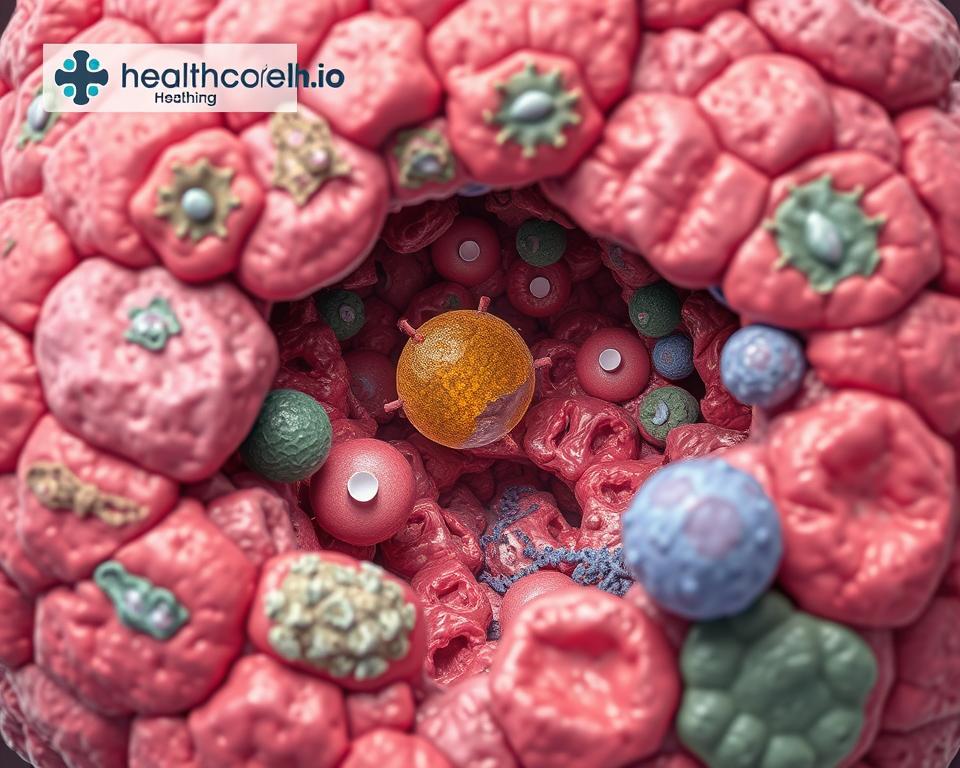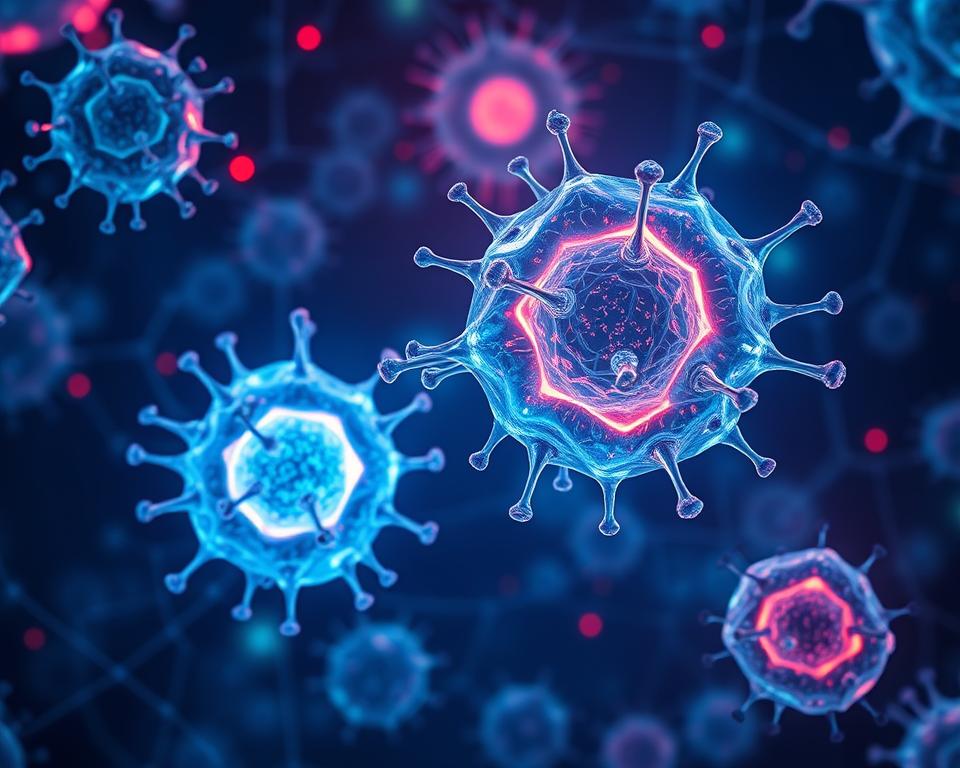Immunotherapy is changing how we treat cancer, focusing on aggressive types like melanoma, kidney, and lung cancers. It uses the body’s immune system to attack cancer cells. This method is proving effective against many cancers, making it a key part of cancer care.
Research in immunotherapy is growing, exploring its use for more than just cancer. It’s being looked at for autoimmune diseases, allergies, and even neurological issues. Thanks to checkpoint inhibitors and CAR-T cell therapy, immunotherapy is giving new hope to cancer patients. It’s shown to increase survival rates in advanced melanoma by 40%, a major breakthrough.
Immunotherapy works by tapping into the immune system’s power. It offers personalized treatments through cancer vaccines that target specific mutations. This makes it a unique and effective way to fight cancer. With a 30% increase in response rates for some cancers in the last five years, this field is rapidly advancing. It promises a bright future for cancer care.
Key Takeaways
- Immunotherapy is a type of cancer treatment that uses the body’s immune system to fight cancer.
- It has been shown to be effective in treating a variety of types of cancer, including melanoma, lung cancer, and kidney cancer.
- Immunotherapy can offer personalized medicine through cancer vaccines targeting specific tumour mutations.
- Checkpoint inhibitors and CAR-T cell therapy are leading forms of immunotherapy.
- Immunotherapy research is expanding beyond cancer treatment to include applications for autoimmune diseases, allergic disorders, and neurological conditions.
- Immunotherapy can improve one-year survival rates in metastatic melanoma by 40% compared to traditional treatments.
Understanding the Fundamentals of Immunotherapy
Immunotherapy is a cancer treatment that uses the body’s immune system to fight cancer. It makes the immune system attack cancer cells. This method has shown great promise in treating many cancers, including lymphoma.
About 75% of patients with Hodgkin lymphoma have less or no MHC class I molecules. This can make cancer immunotherapy less effective.
The aim of targeted therapy is to boost the body’s defense against cancer. This is done through different immunotherapy types, like checkpoint inhibitors and CAR T-cell therapy. By learning how the immune system fights cancer, we can make cancer immunotherapy better.
- Stimulating the immune system to see cancer cells as foreign
- Boosting the body’s natural defense to fight cancer cells
- Using targeted therapy to target cancer cells while protecting healthy ones
By using the immune system and cancer immunotherapy, doctors can offer better treatments. This improves patient outcomes and quality of life.
Types of Cancer Immunotherapy Available Today
Immunotherapy has changed cancer treatment, bringing new hope to many. Checkpoint inhibitors like ipilimumab and nivolumab help fight melanoma and other cancers. Cancer vaccines, such as sipuleucel-T, help the immune system find and destroy cancer cells. Personalized medicine makes treatments fit each patient’s needs.
Some of the most promising types of immunotherapy include:
- Checkpoint inhibitors, which release the brakes on the immune system, allowing it to attack cancer cells
- Cancer vaccines, which stimulate the immune system to recognize and attack cancer cells
- Personalized medicine, which involves tailoring treatments to individual patients’ needs
Studies show immunotherapy works well against many cancers, like melanoma, lung cancer, and leukemia. For instance, checkpoint inhibitors have boosted survival rates in advanced melanoma patients. Cancer vaccines also show promise in treating prostate cancer and other cancers.
As research keeps advancing, we’ll see even more new treatments. Thanks to checkpoint inhibitors, cancer vaccines, and personalized medicine, cancer patients have hope for better, targeted treatments.
How Immunotherapy Differs from Traditional Cancer Treatments
Immunotherapy is a new way to fight cancer. It makes the immune system attack cancer cells. This is different from chemotherapy, which harms all fast-growing cells.
Immunotherapy is better because it only targets cancer cells. This means it hurts healthy cells less. Many patients see their survival rates go up and feel fewer side effects.
Immunotherapy works differently than chemotherapy. Chemotherapy can make you lose your hair, feel sick, and tired. But immunotherapy usually has fewer side effects. It might cause problems like inflammation in organs, though.
Doctors are now mixing immunotherapy with chemotherapy. This mix might make treatments work better. Some studies show it can help patients live longer and fight off drug resistance.
| Treatment | How it works | Side effects |
|---|---|---|
| Immunotherapy | Stimulates the immune system to attack cancer cells | Immune-related adverse events, such as inflammation |
| Chemotherapy | Kills rapidly dividing cells | Hair loss, nausea, fatigue, and increased risk of infection |
Immunotherapy is a hopeful way to fight cancer. It targets cancer cells and has fewer side effects. As research grows, we’ll see better treatments that help patients more.
Key Benefits of Immunotherapy Treatment
Immunotherapy has changed cancer treatment a lot. It boosts the immune system and helps patients live better. It can lead to long-term remission, which is a big win over old treatments.
Some main benefits of immunotherapy are:
- More chances for remission, with 15-20% of patients with tough cancer mutations getting long-term relief
- Better quality of life, with over 50% of patients with metastatic cancer seeing a real immune boost
- Fewer side effects, with 60-70% of patients only feeling mild symptoms like fever or tiredness
- Works better when used with other treatments, like chemo and radiation
Immunotherapy helps the immune system fight cancer cells. This makes treatment more focused and effective. It can lead to longer-lasting results and better survival rates.
As research grows, more cancers can be treated with immunotherapy. This brings hope to many patients. Immunotherapy is key in fighting cancer today, thanks to its ability to improve life quality and chances of long-term remission.
| Cancer Type | Immunotherapy Response Rate |
|---|---|
| Melanoma | 50-60% |
| Lung Cancer | 30-40% |
| Kidney Cancer | 20-30% |
Preparing for Your Immunotherapy Journey
Thinking about immunotherapy as a cancer treatment? It’s key to know what to do first. Immunotherapy uses your body’s immune system to fight cancer. This could lead to long-term control of cancer, even after treatment stops. First, you need to talk to a healthcare provider to see if it’s right for you.
At your first meeting, you’ll share your medical history and current health. Your doctor will also check the type of cancer you have. They might suggest blood tests and imaging to see how far the cancer has spread. These tests help create a treatment plan just for you.
Initial Consultation Requirements
At your first meeting, your doctor will check your health and talk about immunotherapy’s benefits and risks. This is your chance to ask questions and share any worries you have.
Medical Tests and Evaluations
Tests like blood and imaging scans are needed to see how far the cancer has spread. They help your doctor make a treatment plan that fits you best.
Lifestyle Adjustments Before Treatment
Before starting immunotherapy, making lifestyle changes can help. Quit smoking, exercise, and eat well. These actions boost your immune system, making treatment more effective.
Understanding how to prepare for immunotherapy helps you make smart choices about your cancer treatment. Always talk to your doctor about any concerns or questions. And don’t hesitate to ask for help during your immunotherapy journey.
Managing Possible Side Effects and Risks
Immunotherapy, like other cancer treatments, can have side effects and risks. Common side effects include feeling very tired, itchy rash, diarrhea, and nausea. It can also lower thyroid hormone levels. In some cases, it may cause more serious problems like liver issues, stomach problems, and nervous system side effects.
It’s very important to work closely with a healthcare provider to manage these side effects. They can help by giving medication for nausea, recommending rest, and suggesting ways to stay hydrated. Patients should know about possible side effects and tell their doctor right away if they get worse.
Some common side effects of immunotherapy include:
- Fatigue
- Itchy rash
- Diarrhea
- Nausea and vomiting
- Decreased thyroid hormone levels
Even though side effects don’t always mean treatment won’t work, it’s key to watch and manage them. By knowing about the side effects and risks of immunotherapy, patients can make better choices. They can also work with their healthcare providers to lessen any bad effects.
| Side Effect | Description |
|---|---|
| Fatigue | A feeling of tiredness or lack of energy |
| Itchy rash | A skin rash that is itchy and uncomfortable |
| Diarrhea | Frequent and loose bowel movements |
Success Rates and Treatment Outcomes
Immunotherapy has shown great promise in fighting cancer. It has high success rates and better treatment results. Studies show it can lead to long-term remission and better quality of life for many patients.
The success of immunotherapy depends on several factors. These include the cancer type and stage, and the patient’s overall health. Statistical evidence and research data show it works well for melanoma, lung cancer, and kidney cancer, among others.
A study with 160 patients found interesting results. The median overall survival from diagnosis was 474 days. The estimated 5-year survival rate was 11.1%. Patients treated with immunotherapy lived for 18.4 months on average, compared to 9.6 months for those with chemotherapy.
| Treatment Group | Median Overall Survival |
|---|---|
| Immunotherapy | 18.4 months |
| Chemotherapy | 9.6 months |
These results show immunotherapy’s power to improve cancer treatment. As research keeps advancing, it will likely play a bigger role in cancer care.
Cost Considerations and Insurance Coverage
Immunotherapy can cost a lot, from $10,000 to $30,000 a month for cancer. But, there are ways to make it more affordable. You can get help from insurance and financial programs. It’s important to talk to your healthcare team and insurance about how to lower costs.
When looking at insurance for immunotherapy, consider these points:
- Out-of-pocket costs can change based on your insurance and treatment
- Costs for immunotherapy shots can be $20 to $200 each
- Annual costs for allergy treatment can be $1,000 to $2,500
Many insurance plans cover immunotherapy, but how much can vary. Medicare coverage depends on your plan. Medicaid helps those with less money get good care. There are also programs that offer free or low-cost medicines.
Talking about money worries with your doctor can help. 57 percent of people who do this see lower costs. With cancer drug prices up 400 percent in 30 years, finding ways to save is key.
| Insurance Type | Coverage | Out-of-Pocket Costs |
|---|---|---|
| Medicare | Varies by plan | $20-$200 per visit |
| Medicaid | Varies by state | $0-$100 per visit |
| Private Insurance | Varies by plan | $50-$500 per visit |
Finding the Right Healthcare Provider
Finding the right healthcare provider is key for effective cancer treatment with immunotherapy. A provider with experience in immunotherapy can offer personalized care. This is vital for a good treatment outcome.
It’s also important to look at the provider’s communication style and listening skills. Research shows that a doctor’s communication greatly affects patient trust and satisfaction. You can ask for referrals or check online databases like the American Board of Medical Specialties and the American Medical Association to find a qualified provider.
When choosing a healthcare provider for immunotherapy, consider these factors:
- Experience in treating cancer with immunotherapy
- Qualifications and certifications
- Communication style and ability to listen
- Health insurance compatibility
- Availability and accessibility of care
By looking at these factors and finding the right provider, you can get the best care for your cancer. Always ask questions and consider a second opinion if needed.
| Factor | Importance |
|---|---|
| Experience in treating cancer with immunotherapy | High |
| Qualifications and certifications | High |
| Communication style and ability to listen | High |
| Health insurance compatibility | Medium |
| Availability and accessibility of care | Medium |
Monitoring Progress During Treatment
During immunotherapy, monitoring progress is key to see if the treatment is working. This means tracking treatment response, setting up follow-up visits, and checking how well you’re feeling. Working closely with your healthcare team helps ensure you get the best care and makes any needed changes to your treatment.
Some important things to watch when tracking progress during immunotherapy include:
- Tracking changes in tumor size and growth
- Monitoring for side effects and adjusting treatment if needed
- Doing regular blood tests to check how well the treatment is working
Studies show that immunotherapy can be a good treatment for many cancers, like lung, pancreatic, and ovarian cancer. By keeping a close eye on how you’re doing and making changes as needed, you can increase your chances of a good outcome.

Recent studies found that patients who do well with immunotherapy often see a big drop in tumor DNA in their blood. This means checking your blood regularly could be a good way to see how well the treatment is working and make any needed changes.
| Tumor Type | Immunotherapy Treatment | Response Rate |
|---|---|---|
| Lung Cancer | Pembrolizumab (Keytruda) | 20-30% |
| Pancreatic Cancer | Nivolumab (Opdivo) | 10-20% |
| Ovarian Cancer | Atezolizumab (Tecentriq) | 15-25% |
Understanding the importance of monitoring progress during immunotherapy and working closely with your healthcare team lets you take an active role in your care. This way, you can increase your chances of a successful treatment outcome.
Embracing the Future of Cancer Care Through Immunotherapy
Immunotherapy is changing the way we fight cancer. New treatments like neoantigen vaccines are showing great promise. They have led to better survival rates when used with checkpoint inhibitors.
Researchers are finding new targets for vaccines to prevent cancer from coming back. They are also improving T-cell therapies to fight tough tumors. This means immunotherapy could get even better at beating cancer.
Genetic testing and blood tests are making it easier to catch cancer early. Tools like Cologuard help doctors find cancer when it’s most treatable. As immunotherapy keeps growing, we’ll see more tailored treatments that could change lives.
By focusing on cancer care with immunotherapy, we’re bringing hope to many. The path ahead will have its hurdles. But with the hard work of scientists, doctors, and patients, we can make a real difference.













Leave a Reply